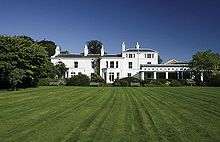Chancellors Hotel & Conference Centre

Chancellors Hotel & Conference Centre (formerly named The Firs), is a Grade II listed[1] mansion in Fallowfield, Manchester, England
The house was built in 1850 for Sir Joseph Whitworth, by Edward Walters, who was also responsible for Manchester’s Free Trade Hall. The house was surrounded by a 52 acres (21 ha) estate.[2] Whitworth used The Firs mainly as a social, political and business base, entertaining radicals of the age such as John Bright, Richard Cobden, William Forster and T. H. Huxley at the time of the Reform Bill of 1867. Whitworth, credited with raising the art of machine-tool building to a previously unknown level, supported the new Mechanics Institute in Manchester –the birthplace of UMIST – and helped to found the Manchester School of Design. To the rear of Chancellors, on the site of the Firs Botanical Gardens belonging to The University of Manchester, Whitworth had a shooting range — now the site of the University's horticultural glasshouses — on which he tested his famous but unsuccessful Whitworth gun featuring a rifled barrel.
In 1882, having built a new house in Darley Dale, Whitworth leased The Firs to his friend C.P. Scott, editor of the Manchester Guardian.[2] After Scott's death the house became the property of the University of Manchester, and was the Vice-Chancellor's residence until 1991.
The house was converted into a hotel and re-opened as the western wing of Chancellors Hotel & Conference Centre in 1997. Today the house is surrounded by five and a half acres of gardens.
References
- ↑ "Listed Buildings in Manchester". p. 4. Archived from the original on February 24, 2007. Retrieved April 13, 2007.
- 1 2 History (Faculty of Life Sciences - The University of Manchester)
External links
- / Chancellors Website
- Historic England. "Details from image database (458154)". Images of England.
- Historic England. "Details from image database (458155)". Images of England.
- Chancellors Hotel & Conference Centre, Fallowfield - Profile on iKnow North West.
Coordinates: 53°26′37″N 2°12′48″W / 53.44361°N 2.21333°W





